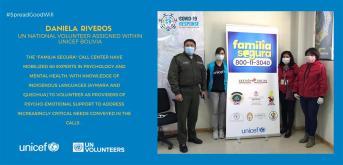Bolivia has one of the region’s highest rates of domestic violence and violence against women. This has been exacerbated by the Coronavirus pandemic, as has been observed in worldwide trends. Daniela Riveros has served as a national UN Volunteer for two years in the area of protection of youth and adolescents with the UN Children's Fund (UNICEF) in Bolivia. Together with her team, she knew just how critical a quick response would be. Thousands of children, adolescents and women would inevitably find themselves in situations of risk, vulnerability and violence as a result of the COVID-19 lockdown, and different means of reaching them would be needed.
Virginia Pérez, Chief of the Child Protection Programme with UNICEF in Bolivia, drew on her past experience as a volunteer with a free phone helpline in Spain that assisted children, recalling the impact it had and how they were able to enter the heart of a family through the phone.
She proposed the idea of establishing a call center to Daniela, who, the next day, already had it conceptualized – the structure, how to organize it, whom to contact. The Familia Segura (Safe Family) call center became operational in record time – on 1 April, only three weeks after conception – and by end-July, 13,500 calls had been attended to throughout the country.
The agility of the response is not only reflected in its quick launch. Initially established to prevent violence within the home in the COVID-19 context and provide emotional support for anyone and everyone who needed it, Familia Segura’s structure was adjusted to address other – and increasingly critical – needs conveyed in the calls. An operational filter redirects callers to different channels for attention: psychologists from the School of Psychologists of La Paz, clinical psychologists from the Department of Psychology at the Bolivian Catholic University, or psychiatrists from the Mental Health Unit of the Hospital de Clínicas and from the Department of Health of La Paz. In cases of violence, coordinated efforts with the police, the Task Force to Combat Violence and the protection system for both children and women enable immediate referral and intervention.
To ensure the responses are both inclusive and tailored, different specializations exist within the call center, including for indigenous languages, for frontline workers, for children with disabilities or special needs, among others.
Daniela’s dedication and leadership were fundamental in the vision and implementation of the call center, and remain fundamental in its ongoing coordination. In addition to passion, personal conviction, and motivation, her knowledge and experience – particularly in community psychology and within vulnerable populations – have been of immense value in Familia Segura’s roll out, as well as in its development into a more integrated programme:
This offer really requires, required and will continue to require an expertise in mental health, in psychology, in the different areas of intervention […]. Daniela speaks the language. --Virginia Pérez, Chief of the Child Protection Programme with UNICEF, Bolivia
This opportunity to contribute her expertise to serve others encompasses what Daniela deems to be so enriching about volunteering, which she has done for many years of her life.
Sometimes we think that only the question of payment, or how much you are paid, or why you are paid, is important, but for me the most important thing is the conviction that one has to have in life, in what one believes, in what one thinks, and in what one does. Being true to that, I think, is the most important thing. --Daniela Riveros, national UN Volunteer with UNICEF, Bolivia
Familia Segura harnesses the power of volunteerism; 50 highly experienced professional volunteers are part of the initiative at time of writing. Understanding the importance of keeping the volunteers engaged, Daniela and her team organize motivational and educational sessions. The training and capacity building empower the volunteers, not only in their role within the call center, but also in their profession as a whole.
Yet, as Daniela highlights, the calls themselves represent a source of motivation for everyone involved:
The impact and the results are very rewarding: the community, the people, the children, the adolescents, the women who call to thank us and say, ‘You have changed my life,’ or ‘You have saved my life.’ I think this is very rewarding for these professionals and for all of us who are involved in Familia Segura. -- Daniela Riveros
The tremendous, growing impact of the call center would not be possible without the deeply committed volunteers. Rafael Ramírez, Head of UNICEF Bolivia, imparts the following message to the individuals making it possible:
My message is first one of deep, heartfelt gratitude and second of motivation. This is what we need as a society, as a global society, as a world: commitment, professionalism, and generosity. So thank you, volunteers, and let’s keep going. --Rafael Ramírez, Head of UNICEF Bolivia
And they will keep going. In alignment with the aim to leave no one behind, Familia Segura could become a fundamental part of the system of protection of children and adolescents in Bolivia. It could reach people who could not be reached before. It could reach people who had been suffering but did not know which resources were available to them, or were otherwise unable to afford the necessary services. It could change the conversation about – and continue raising awareness around the importance of – mental health in the country.
The time to begin to “build back better” is now.
This article was prepared with the kind support of Online Volunteer Kaylin Lang.

